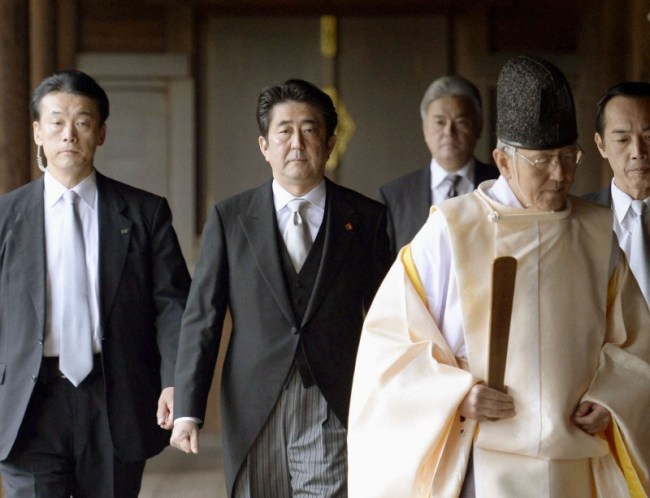
Japanese Prime Minister Shinzo Abe became the country’s first leader to visit the controversial Yasukuni Shrine in almost eight years on Thursday, prompting strong condemnation from Korea and China.
The U.S. expressed “disappointment,” calling on the Northeast Asian countries to find “constructive ways” to deal with historical issues.
Seoul called Abe’s visit “deplorable and outrageous” and summoned a senior Japanese Embassy official to lodge a protest.
“Prime Minister Abe’s worship at the Yasukuni Shrine lays bare his erroneous historical perception, and is an anachronistic act that damages not only Korea-Japan relations but also the foundations of stability and cooperation in Northeast Asia,” Korean Culture, Sports and Tourism Minister Yoo Jin-ryong said as top government spokesperson.
“Abe is expressing his intention to contribute to the international community under the name of so-called ‘active pacifism,’ but we cannot but question if he truly thinks he can promote peace with such a wrong historical view.”
China also said in a statement, “The essence of Japanese leaders’ visits to the Yasukuni Shrine is to beautify Japan’s history of militaristic aggression and colonial rule.”
Luo Zhaohui, director general of Asian affairs at the Foreign Ministry, also lambasted the move as “absolutely unacceptable,” warning that Tokyo “must bear consequences.”
The trip marked the first anniversary of Abe’s second premiership, which has been credited with kick-starting a long-awaited economic stimulus at home yet fueled concerns of neighbors over its drastic drift to the right.
It was the first prime ministerial visit since that of Junichiro Koizumi on Aug. 15, 2006.
The temple venerates nearly 2.5 million Japanese war dead including 14 “Class A” World War II criminals and colonial leaders. It also has long been a source of diplomatic contention due to frequent worship by right-wing nationalist politicians who often wield their revisionist views as a political weapon.
For Seoul and Beijing, his pilgrimage is seen as proof that Tokyo does not repent for its imperialist past and wartime and colonial transgressions including massacres, sex slavery and forced labor. The move is expected to strain Japan’s ties with the two neighbors, which have also been dogged by sovereignty feuds over a set of small islets in the East Sea and the East China Sea, respectively.
Abe defended his decision by saying he went not to pay tribute to war criminals but to “report before the souls of the war dead how my administration has worked for one year and renew the pledge that Japan must never wage a war again.”
“For 68 years after the war, Japan created a free and democratic country, and consistently walked the path of peace. There is no doubt whatsoever that we will continue to pursue this path,” he said in a statement after the trip.
“It is not my intention at all to hurt the feelings of the Chinese and Korean people. It is my wish to respect each other’s character, protect freedom and democracy, and build friendship with China and Korea with respect.”
Korea’s Vice Foreign Minister Kim Kyou-hyun summoned Takashi Kurai, a minister and deputy chief of the Japanese Embassy here, in place of Ambassador Koro Bessho who was on vacation.
Kim told Kurai that Abe’s choice “defied the international community’s concerns and warnings and demonstrated that his statement lacks sincerity in itself.”
Though President Park Geun-hye set improvement of ties with Japan as one of her key diplomatic tasks, her summit with Abe now appears less likely.
During his first stint in 2006-07, Abe stayed away from the shrine in consideration of the country’s relationship with its neighbors. That position was welcomed abroad, but he later called it a “mistake.”
The event was apparently aimed at boosting the sliding popularity of Abe, who has been taking flak from ultraconservatives, one of the core groups backing his Liberal Democratic Party, for refraining from visiting the shrine and not taking a vigorous enough approach to an array of other nationalist steps.
His approval ratings dropped below 50 percent early this month for the first time since he took power, pummeled by the enactment of a state-secrets law calling for tougher penalties for leaks, which invited a stringent public backlash.
In a poll by Japan’s Asahi Shimbun, the figures tumbled by 4 percent to 49 percent from a month earlier, though another survey by Kyodo News showed that it picked up by 6.6 percent to reach 54.2 percent early this week from two weeks before.
For the U.S., Abe’s visit to Yasukuni is an uncomfortable development. While maintaining a stern stance toward humanitarian issues such as sexual slavery, Washington has been calling for more forward-looking relations between its two prime allies, key to trilateral cooperation to rein in North Korea and other regional threats.
In May, Abe sparked criticism after likening Yasukuni to the Arlington National Cemetery just outside Washington in a media interview, which is home to some 400,000 fallen U.S. troops from the Civil War to battles in Iraq and Afghanistan.
In an apparent swipe at the hawkish premier, U.S. Secretary of State John Kerry and Secretary of Defense Chuck Hagel in October laid a wreath at Chidori ga Fuchi, a Tokyo cemetery which Washington officials called Japan’s “closest equivalent” to Arlington.
The U.S. also gave a “chilly response” when Abe’s special advisor Seiichi Eto floated his trip to Yasukuni during meetings with Washington officials last month, Japan’s Yomiuri Shimbun reported Tuesday.
“Japan is a valued ally and friend. Nevertheless, the United States is disappointed that Japan’s leadership has taken an action that will exacerbate tensions with Japan’s neighbors,” the U.S. Embassy in Tokyo said in a statement.
By Shin Hyon-hee
(heeshin@heraldcorp.com)




![[Music in drama] Rekindle a love that slipped through your fingers](http://res.heraldm.com/phpwas/restmb_idxmake.php?idx=644&simg=/content/image/2024/05/01/20240501050484_0.jpg&u=20240501151646)

![[New faces of Assembly] Architect behind ‘audacious initiative’ believes in denuclearized North Korea](http://res.heraldm.com/phpwas/restmb_idxmake.php?idx=644&simg=/content/image/2024/05/01/20240501050627_0.jpg&u=20240502093000)




![[KH Explains] Will alternative trading platform shake up Korean stock market?](http://res.heraldm.com/phpwas/restmb_idxmake.php?idx=644&simg=/content/image/2024/05/01/20240501050557_0.jpg&u=20240501161906)






![[Today’s K-pop] Stray Kids go gold in US with ‘Maniac’](http://res.heraldm.com/phpwas/restmb_idxmake.php?idx=642&simg=/content/image/2024/05/02/20240502050771_0.jpg&u=)